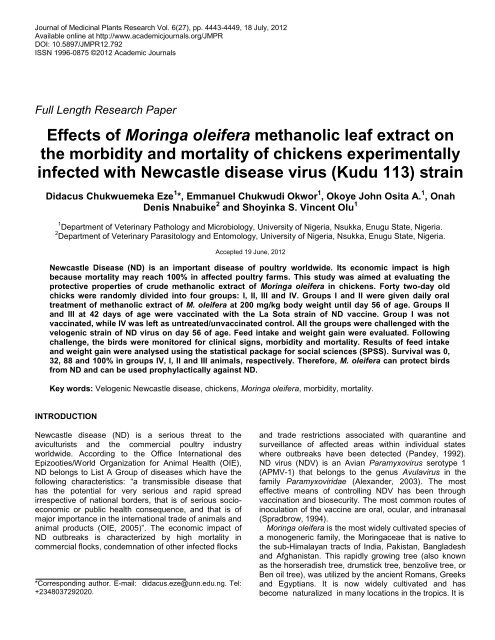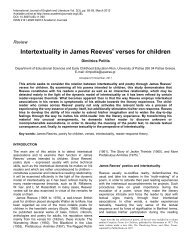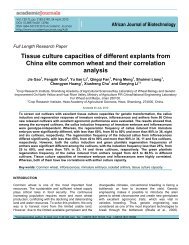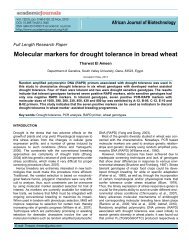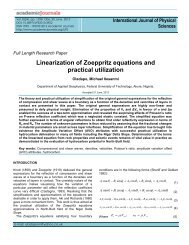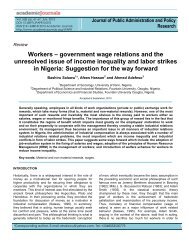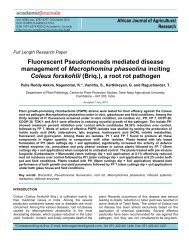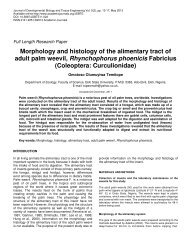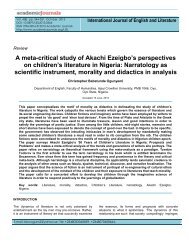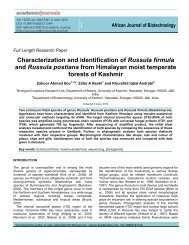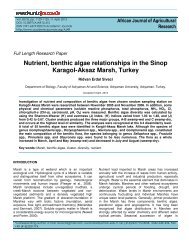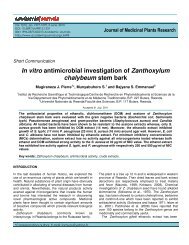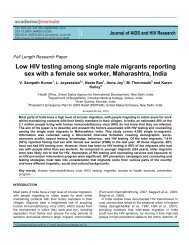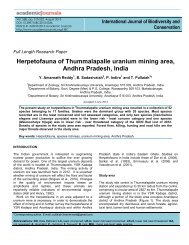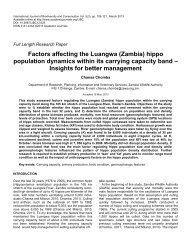Download Complete Issue (4740kb) - Academic Journals
Download Complete Issue (4740kb) - Academic Journals
Download Complete Issue (4740kb) - Academic Journals
Create successful ePaper yourself
Turn your PDF publications into a flip-book with our unique Google optimized e-Paper software.
Journal of Medicinal Plants Research Vol. 6(27), pp. 4443-4449, 18 July, 2012<br />
Available online at http://www.academicjournals.org/JMPR<br />
DOI: 10.5897/JMPR12.792<br />
ISSN 1996-0875 ©2012 <strong>Academic</strong> <strong>Journals</strong><br />
Full Length Research Paper<br />
Effects of Moringa oleifera methanolic leaf extract on<br />
the morbidity and mortality of chickens experimentally<br />
infected with Newcastle disease virus (Kudu 113) strain<br />
Didacus Chukwuemeka Eze 1 *, Emmanuel Chukwudi Okwor 1 , Okoye John Osita A. 1 , Onah<br />
Denis Nnabuike 2 and Shoyinka S. Vincent Olu 1<br />
1 Department of Veterinary Pathology and Microbiology, University of Nigeria, Nsukka, Enugu State, Nigeria.<br />
2 Department of Veterinary Parasitology and Entomology, University of Nigeria, Nsukka, Enugu State, Nigeria.<br />
Accepted 19 June, 2012<br />
Newcastle Disease (ND) is an important disease of poultry worldwide. Its economic impact is high<br />
because mortality may reach 100% in affected poultry farms. This study was aimed at evaluating the<br />
protective properties of crude methanolic extract of Moringa oleifera in chickens. Forty two-day old<br />
chicks were randomly divided into four groups: I, II, III and IV. Groups I and II were given daily oral<br />
treatment of methanolic extract of M. oleifera at 200 mg/kg body weight until day 56 of age. Groups II<br />
and III at 42 days of age were vaccinated with the La Sota strain of ND vaccine. Group I was not<br />
vaccinated, while IV was left as untreated/unvaccinated control. All the groups were challenged with the<br />
velogenic strain of ND virus on day 56 of age. Feed intake and weight gain were evaluated. Following<br />
challenge, the birds were monitored for clinical signs, morbidity and mortality. Results of feed intake<br />
and weight gain were analysed using the statistical package for social sciences (SPSS). Survival was 0,<br />
32, 88 and 100% in groups IV, I, II and III animals, respectively. Therefore, M. oleifera can protect birds<br />
from ND and can be used prophylactically against ND.<br />
Key words: Velogenic Newcastle disease, chickens, Moringa oleifera, morbidity, mortality.<br />
INTRODUCTION<br />
Newcastle disease (ND) is a serious threat to the<br />
aviculturists and the commercial poultry industry<br />
worldwide. According to the Office International des<br />
Epizooties/World Organization for Animal Health (OIE),<br />
ND belongs to List A Group of diseases which have the<br />
following characteristics: “a transmissible disease that<br />
has the potential for very serious and rapid spread<br />
irrespective of national borders, that is of serious socioeconomic<br />
or public health consequence, and that is of<br />
major importance in the international trade of animals and<br />
animal products (OIE, 2005)”. The economic impact of<br />
ND outbreaks is characterized by high mortality in<br />
commercial flocks, condemnation of other infected flocks<br />
*Corresponding author. E-mail: didacus.eze@unn.edu.ng. Tel:<br />
+2348037292020.<br />
and trade restrictions associated with quarantine and<br />
surveillance of affected areas within individual states<br />
where outbreaks have been detected (Pandey, 1992).<br />
ND virus (NDV) is an Avian Paramyxovirus serotype 1<br />
(APMV-1) that belongs to the genus Avulavirus in the<br />
family Paramyxoviridae (Alexander, 2003). The most<br />
effective means of controlling NDV has been through<br />
vaccination and biosecurity. The most common routes of<br />
inoculation of the vaccine are oral, ocular, and intranasal<br />
(Spradbrow, 1994).<br />
Moringa oleifera is the most widely cultivated species of<br />
a monogeneric family, the Moringaceae that is native to<br />
the sub-Himalayan tracts of India, Pakistan, Bangladesh<br />
and Afghanistan. This rapidly growing tree (also known<br />
as the horseradish tree, drumstick tree, benzolive tree, or<br />
Ben oil tree), was utilized by the ancient Romans, Greeks<br />
and Egyptians. It is now widely cultivated and has<br />
become naturalized in many locations in the tropics. It is


